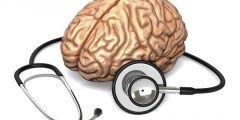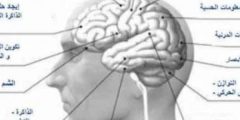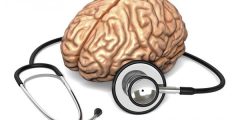Nerve tension
Stress is defined as a state that the body goes through due to its exposure to a specific situation that stimulates tension, such as: standing in a suffocating traffic jam, or being late for an important meeting. In this case, the control tower in the brain called the hypothalamus (in English: hypothalamus) acts and sends orders to secrete stress hormones. It is the same thing that stimulates the fight or flight response in the body, which in turn leads to an acceleration of the heartbeat, an increase in the speed of breathing, and the preparation of the muscles for any reaction. This response protects the body in the event of an emergency by preparing the body to respond quickly, unless... If the response to psychological stress and tension continues day after day, the body’s health can be at risk. It is worth noting that exposure to stress or pressure is not necessarily bad, as it is what helped the first human to survive, and in this day it is what helps humans avoid a specific accident or danger and deliver work at a specific time, and in fact the way people deal with their exposure to stress varies. Stress is based on the personal characteristics and resources available to each person, but in all cases stress must be temporary, and once the condition ends or the danger is removed, the body must return to its normal state without any negative impact within a short time. The muscles should relax, and the heart rate and breathing should return to normal.
Read also:What is the treatment for vertigo?
Symptoms of nerve tension
It should be noted that the first step to getting rid of stress is to know the cause of stress. In fact, most people who suffer from stress do not know that they are stressed until they reach the breaking point. In the context of talking about stress, it should be stated that it affects all aspects of life for people who suffer from it. ; It affects emotions, feelings, actions, the ability to think, and physical health, and because people deal differently with stress, the symptoms vary from one person to another, and the following is a statement of the most important of these symptoms:
- Emotional symptoms:
- Feeling angry and upset easily.
- Feeling moody quickly.
- Feeling exhausted and losing control.
- Difficulty relaxing and calming the mind.
- Feeling bad about oneself; For example, some people feel low self-esteem, loneliness, lack of self-worth, and depression, in addition to avoiding others.
- Physical symptoms:
- Loss of energy.
- headache;
- Stomach upset, including diarrhea, constipation, and nausea.
- Aches and pains in tense muscles.
- Insomnia.
- Chest pain and rapid heartbeat.
- Loss of sexual desire.
- Frequent exposure to colds and infections.
- Nervousness, body shaking, and ringing in the ear.
- Dry and sweaty hands and feet.
- Dry mouth and difficulty swallowing.
- Cognitive symptoms:
- Constant anxiety.
- Forgetfulness and chaos.
- Inability to concentrate.
- Pessimism and negative thinking.
- Racing thoughts.
- Behavioral symptoms:
- Change in appetite: either not eating, or eating too much.
- Procrastination and lack of responsibility.
- Increased use of alcohol, drugs, and cigarettes.
- Nervous behavioral behaviors such as nail biting, restlessness, and impulsiveness.
Read also:Causes of left hand numbness
Causes of nerve tension
It is worth noting that a person's exposure to positive events in his life can increase his stress, such as: getting married, going to university, and getting a new job, but this part of stress is considered good in a person's life. On the other hand, negative stress is classified into many types, each of which results from many reasons, as follows:
- Causes of acute stress:Acute stress results from avoiding a specific incident or from a verbal argument or quarrel with a stranger. The stress response is activated, and the body secretes stress hormones. After the stimulus disappears, the body returns to its normal state. As follows: Statement of the most important causes of acute stress:
- The sudden outbreak of conflict or conflict.
- Exposure to a medical procedure or operation.
- Being exposed to a certain accident, avoiding it with difficulty, and surviving it miraculously.
- Exposure to certain harm or fall.
- Causes of PTSD: Shock is a type of acute stress, but this type is considered more severe. It involves exposure to the feeling of actual death and a real threat to life, and these types of stressful and stressful events can lead to more severe problems such as post-traumatic stress disorder. The following are the reasons that may lead to this type of stress:
- Exposure to traffic accidents.
- Exposure to physical and sexual assaults.
- Exposure to natural disasters.
- Suffering from serious illness or injury.
- Death of a family member or loved one.
- Causes of chronic stress: A person suffers from chronic stress (in English: Chronic stress) as a result of repeated exposure to acute stress, in addition to continuing to feel stressed for long periods, as this type of stress leads to the activation of the stress response and the secretion of stress hormones for long and repeated periods, leading to negative health consequences, and the following is a statement: Causes of chronic stress:
- Having a chronic disease and having to live with it.
- The presence of conflicts in social relationships.
- Exposure to stress in the work or school environment.
- Daily exposure to traffic congestion.
- Caring for someone with a chronic illness.
- Exposure to financial problems.
- Lack of work-life balance.
Read also:Treatment of left leg numbness
Ways to manage stress
Stress is managed and tried to get rid of it through change, which is represented by changing thoughts and feelings towards the cause of the stress, changing the daily program, changing the environment, and changing the way of dealing with problems and crises. This is with the aim of achieving a balance in life between work, social relationships and relaxation, in addition to having the flexibility necessary to cohesion under pressure and to face challenges. Below is a statement of the most important methods that are useful in managing stress:
- Find out the cause of stress.
- Avoid unnecessary stressors.
- Change and avoid any situation or person that causes stress.
- Coping with stress; If a person is unable to change the situation, it is better for him to change his thinking and feeling about the situation.
- Accept things that cannot be changed.
- Make time for fun and relaxation.
- Follow a healthy lifestyle rich in healthy food, exercise, and sleeping enough hours.









